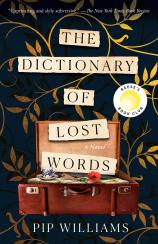The Dictionary of Lost Words
Review
The Dictionary of Lost Words
A historical novel about the making of the Oxford English Dictionary might not appeal to many at first. “A book about words?” my mother asked when she saw me read it. However, Pip Williams’ THE DICTIONARY OF LOST WORDS is far from dry. What one must understand --- whether before or after reading this book --- is that words are living things that have evolved along with us. Dictionaries may have denotations, but real-life interactions and novels will contain connotations. Which are more important? And what qualifies a word for its place in a dictionary?
Williams writes with these themes in mind as the reader follows the life of Esme Nicoll, the fictional daughter of one of the OED’s fictional editors (most of the characters are based on real people). At the dictionary’s sorting table, the six-year-old notices that a slip of paper has fallen and no one seems to miss it. She reads on the slip “bondmaid,” and so she begins to collect words that have been forgotten.
"If you’re a word lover, linguist, lexicographer or grammarian, this is the novel you’ve been waiting for without even realizing it. If you never thought of words in this way before, don’t worry: Williams will convince you of a word’s importance in a most lovely and charismatic story."
One of the central themes is loss, and Williams beautifully connects the loss of people with the loss of words. When Esme grows up and realizes that the dictionary is focused on the male experience in Britain, she begins to go out in search of words from lower-class women in the market. There she finds words that others deem unrepeatable (such as the C word), and yet such words have been recorded already for hundreds of years. That language clearly isn’t going anywhere, and Esme believes it ought to be recognized by somebody.
The different perspectives at play in THE DICTIONARY OF LOST WORDS is interesting --- Esme detests the term “bondmaid”; a male character like Mr. Madan hates the C word. But as Esme’s best friend, Lizzie, tells her: “[Horrible] it may be, but it’s a true word. Dictionary or no, bondmaids will always exist.” Replace “bondmaid” here with anything else, and it will be true. Even the ugly words have something to share --- whether it’s a simple part of a woman’s life, or it reflects an injustice. Something like “bondmaid,” which refers to a female slave, can’t be erased because the history of slavery can't be erased. However, such language can be forgotten, which is a loss to present and future generations. Throughout the novel, Esme and other characters experience the loss of people, and with those people, their words. When a friend, from whom Esme often collected words, passes away, she makes the connection of how one’s words can be their memory and legacy.
In addition to loss, Williams brilliantly ties in the influences of both the women’s suffrage movement and World War I. When it comes to Esme’s feminine experiences (I would go into more detail, but I wouldn’t want to spoil it), at times she is at a loss for words because there aren’t right ones for the emotion. Simultaneously, a man who goes to fight in France cannot find the adequate words for war’s atrocities. This confirms Esme’s narrations of worry when it comes to defining terms like “war” properly. How could they in the Scriptorium (where they edit the dictionary) understand? They weren’t on the continent fighting, risking their lives and seeing others die. And yet, even the soldiers themselves might not have definitions that fully depict their meanings. Still, this only emphasizes the connections between lived experiences and language, and how the two can cyclically influence each other.
If you’re a word lover, linguist, lexicographer or grammarian, this is the novel you’ve been waiting for without even realizing it. If you never thought of words in this way before, don’t worry: Williams will convince you of a word’s importance in a most lovely and charismatic story.
Reviewed by Margaret Rothfus on April 23, 2021
The Dictionary of Lost Words
- Publication Date: May 3, 2022
- Genres: Fiction, Historical Fiction
- Paperback: 416 pages
- Publisher: Ballantine Books
- ISBN-10: 1984820745
- ISBN-13: 9781984820747




